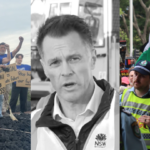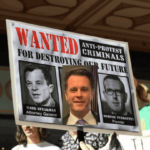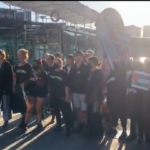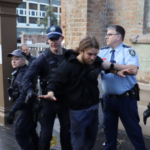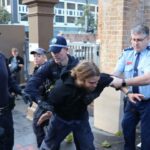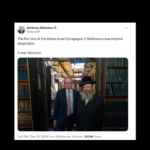NSW Government Proposes to Extend Anti-Protest Regime to “Places of Worship”
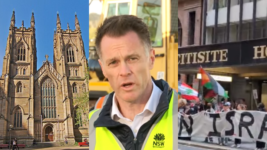
Just when it appeared that NSW premier Chris Minns had exhausted all possible avenues to further expand the draconian NSW antiprotest regime, the top Labor minister has pulled yet another rabbit out of his hat, and this time the potential prohibition would entail no more demonstrations outside places of worship.
The idea hasn’t come in a vacuum, of course, as the proposal was sparked by an arson attack perpetrated upon the Addas Israel Synagogue of Melbourne in the city’s southeastern suburb of Ripponlea at around 4 am last Friday, December, which caused injury to one individual, as well as significant damage to the building itself.
“I’ve asked the attorney general and the cabinet office to look at ways we can better protect places of worship from protests and provide reform options to government,” Minns said in a statement last Sunday, adding that he was “horrified by the attack at the Addas Israel Synagogue in Melbourne, and the recent sight of protests out the front of a religious institution”.
In his statement and proposal, Minns has linked the firebombing of a synagogue in Naarm-Melbourne, which the PM has since deemed a terror act, to a peaceful nonviolent protest that took place on Gadigal land outside Sydney’s Great Synagogue on 4 December, countering an event held by Technion, an Israeli institute complicit in violent and illegal Israeli expansion into Palestinian territory.
So, while in the wake of the horrendous destruction of the Addas Israel Synagogue, the premier’s assertion that a protest ban might be applied in response during a short nightly news grab might seem reasonable, a moment’s reflection reveals that Minns has seized on an act of deplorable violence, in order to advance the long-term bipartisan goal of stamping out protest in NSW.
“Inflammatory and provocative”
“Everyone has a right to gather at mosques, churches, synagogues, and places of worship to participate in their faith free from intimidation,” the 8 December NSW government presser reads. “And while everyone has the right to protest peacefully in NSW, the right to peaceful assembly does not permit or excuse the intimidation or vilification of people based on their faith or religion.”
However, just like the conflation of the terror act upon a synagogue in another state with a peaceful rally outside a place of worship that was hosting a particular event here, the suggestion now is that the 70-odd pro-Palestinian protesters outside the CBD synagogue, who were concerned about the Israeli Institute of Technology, were rather gathered to vilify Jewish people, and this is a distortion.
Another significant conflation that is underpinning this episode, and many other matters playing out in the public narrative at the moment, is the conflation of political sentiment in opposition to the Israeli state and its actions with antisemitism, or prejudice towards Jewish people.
This dangerous conflation is impacting now as pro-Palestinian demonstrators, who oppose Israeli military operations in the Gaza Strip that both the International Court of Justice and Amnesty International have identified as a genocide, can be charged with antisemitism for naming the crime and advocating for its end because in a roundabout sort of way, this is critical of Israel.
Drowning out their voices
Labor then claims there have been too many instances of people protesting at places of worship across the country of late.
But besides the recent protesting outside of the Great Synagogue – by Sydney’s pro-Palestinian movement, which includes numerous Jewish people and was protesting an entity involved in the genocide-drive – most of these actions in the past have involved churches.
When people have protested outside of Christian churches it has most often been in relation to the child sex offences of the clergy and the broad coverup of these crimes on the part of the church.
Following such demonstrations, however, politicians do not commence pontificating about the vilification of Christians and nor has the government cried for further bans on public demonstrations.
Indeed, along with his strong conservative advocacy for the suppression of the right to protest, the NSW premier also represents the devout Christian voice in state parliament, so it might be that the current gaps in rationality involved the reasoning behind the proposal to ban protests outside of places of worship are convenient distortions to advance an old gripe regarding church protests.
As prime minister Anthony Albanese threw his weight behind the places of worship protest ban proposal on Wednesday, Senator David Shoebridge was prompted to write on X, “This is deeply undemocratic. I’ve worked with so many courageous survivors of child sexual abuse who have protested outside the churches who let them down.”
“I’ve been proud to stand with them to get justice,” the Greens senator continued.
“Will Minns and Albanese now arrest them for this?”
Smothering the right to protest
Attacks on the right to protest have become a signature of the Minns government. NSW Labor first displayed this tendency in March/April 2022, when the party facilitated the passing of the Coalition-drafted provisions that establish the NSW antiprotest regime, which are considered to be some of the most draconian laws to silence dissent on the planet.
This antiprotest regime comprises of two main offences disrupting a major facility and disrupting major bridges, tunnels and roads. These laws result in protesters who disrupt certain facilities across the state or bridges, tunnels and roads in the Greater Sydney, Newcastle and Wollongong regions, without authorisation, then facing up to 2 years imprisonment and/or a fine of $22,000.
Over the past 14 months, however, the NSW premier has turned his opposition towards public demonstrations to the authorised weekly Free Palestine protests on Gadigal land in the Sydney CBD. And in October, the top minister suggested that due to the cost of policing these demonstrations, NSW police might be able to refuse regular street protests on financial grounds.
The government further passed another new protest measure in November, to ensure that the crime of obstructing a railway, contrary to section 213 of Crimes Act 1900 (NSW), now carries the standard antiprotest regime financial penalty of up to a $22,000 fine, so that it could accompany the preexisting 2 years imprisonment that already applied to this crime.
Further erosion of liberties
NSW Council for Civil Liberties president Timothy Roberts derides the idea of further encroachments upon the right to protest, as he explained that there are already a plethora of laws that protect against vilification and discrimination in NSW, while the offence of publicly threatening or inciting violence on various grounds, contrary to section 93Z of the Crimes Act, carries up to 3 years inside.
The NSWCCL considers the protest ban outside of religious sites would undermine freedom of speech and the right to public assembly, as these “institutions exercise significant and overt political power in Australian politics”, making them legitimate sites to protest in a democracy. And there are further concerns that entire sites, such as Hyde Park North, could become protest free zones.
“The attack on the Melbourne synagogue is distressing,” said Roberts in an 11 December statement. “The Minns Labor government should be ashamed that it is attempting to utilise this reprehensible and violent act to repress political expression in NSW and silence freedom of speech.”
“Social cohesion cannot be secured if the NSW government continues to restrict civil liberties,” he further made certain.
“Banning the right to protest outside places of worship will not make communities safer. There is a real risk that in doing so, the NSW government will sow the seeds for future division.”


